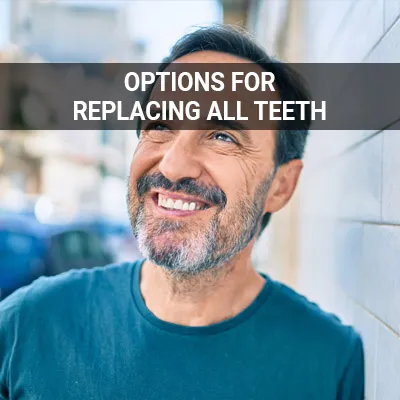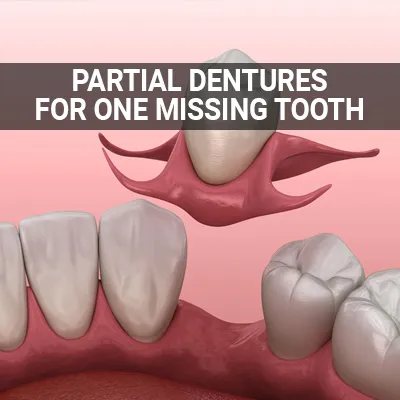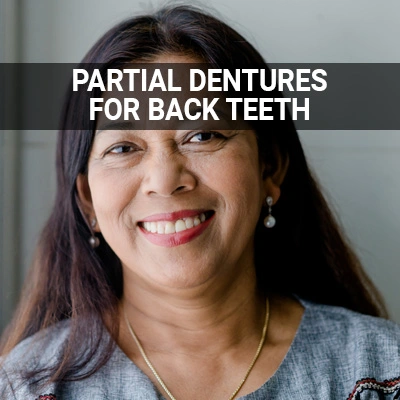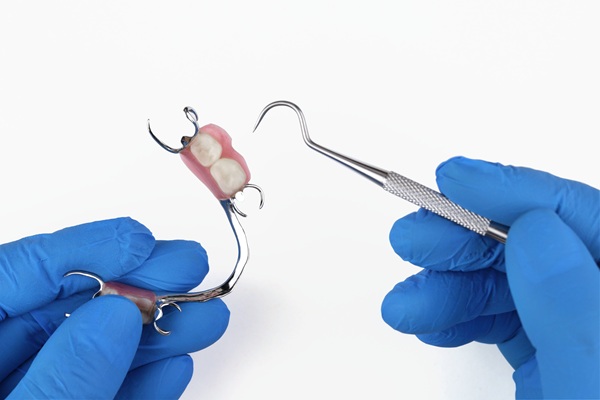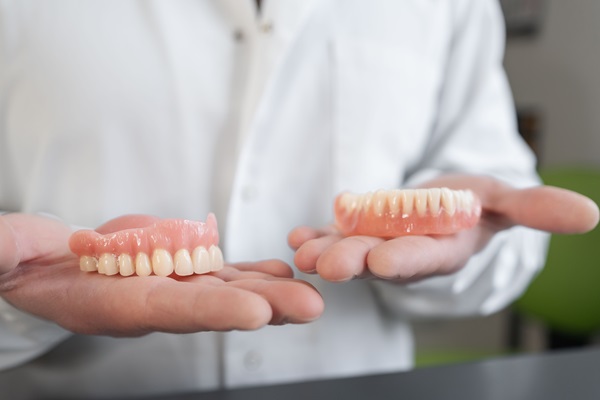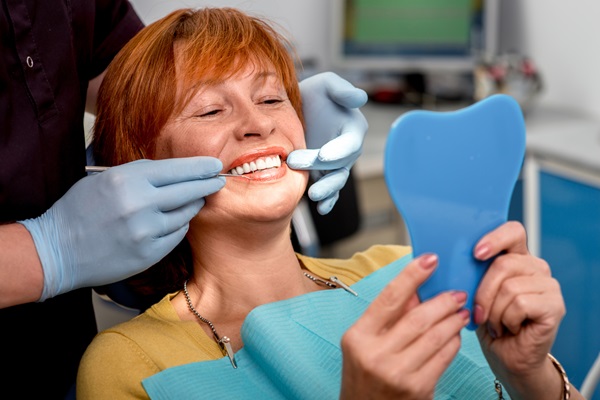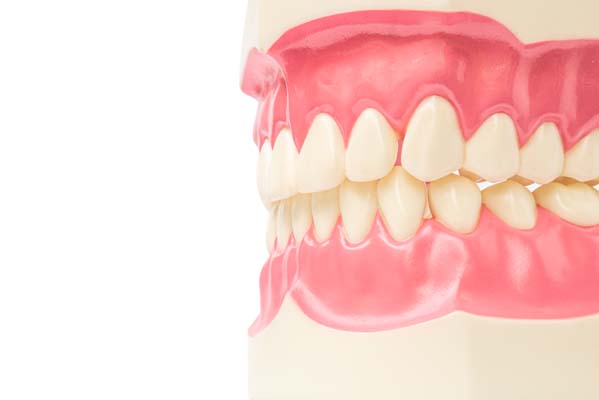Dentures and Partial Dentures Los Angeles, CA
Dentures and partial dentures are artificial teeth that can replace an entire row of teeth or all teeth in a mouth. No matter the reason for tooth loss in adults, we can use dentures to provide an effective and natural-looking replacement. With our dentures, you will be able to eat and speak as you usually would. We offer full and partial dentures customized to your needs.
Dentures and partial dentures are available at Dr. Robert B Tamaki, DDS in Los Angeles and the surrounding area. Along with helping patients chew and speak without issue, dentures can also help create the appearance of a full smile again. With our help, you can obtain a set of functioning teeth and restore your smile.
Call us today at (310) 402-0156 and schedule a time to discuss replacing your teeth with dentures or partial dentures or learn more about our services.
Types of Dentures
As discussed in an article by the Oral Health Foundation, there are differences between full and partial dentures. Full dentures are a good option for patients with no remaining teeth or whose damaged teeth are beyond repair. Meanwhile, a partial appliance makes sense when the person still has some natural teeth remaining. At Dr. Robert B Tamaki, DDS, we can fit patients with either one of these mouth appliances.
There are forms of permanent dentures as well, though these may not be as common as the removable type. Permanent dentures can be more secure and durable. With permanent dentures, we anchor this apparatus to the jaw with implants. People choose these dentures to help avoid the embarrassment of the appliance slipping out while the person speaks or eats. Dental professionals are the only ones who can remove permanent dentures.
“As discussed in an article by the Oral Health Foundation, there are differences between full and partial dentures.”
Alternative Options to Dentures
Dentures and partial dentures are two of the most common forms of tooth replacement treatment. However, there are other options available at our practice. These include dental bridges and dental implants. We will determine the most effective option for the patient's specific needs. Every patient's situation is different and needs a different solution.
There are various factors to consider when deciding on a replacement option with dental bridges and dental implants, such as cost, patient expectations, and more. During a consultation, we will answer any questions the patient has about the different options so they can make an informed decision.
“There are various factors to consider when deciding on a replacement option with dental bridges and dental implants, such as cost, patient expectations, and more.”
Process of Making Dentures
Our dentist will first meet with the patient to discuss the treatment and what to expect. Team members will take X-rays before making impressions of the patient's mouth. These will go to a lab technician who can customize the appliance for the patient. At this first appointment, our dentist may remove any decayed or severely damaged teeth. If necessary, this may occur at a subsequent appointment.
Once the dentures are ready, the patient will return to Dr. Robert B Tamaki, DDS for the fitting process. This appointment will also happen after the gums have healed following any tooth extractions. In making sure the dentures fit correctly, we will also make any adjustments when necessary. Once complete, the patient will be able to bite down without issue.
“Once the dentures are ready, the patient will return to Dr. Robert B Tamaki, DDS for the fitting process.”
Check out what others are saying about our dental services on Yelp: Dentures and Partial Dentures in Los Angeles, CA
How to Care for Dentures
Dentures do require ongoing maintenance outside of the typical oral hygiene routine. Many people believe they can set dentures down by the side of the bed. However, this can lead to warping and cracking over time.
Patients should soak dentures overnight. Avoid hot water, as this may also cause warping. Never use a denture solution directly in the mouth. Patients who use denture solutions should rinse thoroughly before placing dentures in the mouth because denture solutions should not be ingested. Our team can help you determine if a solution is right for your regimen.
It is also important to note that dentures require cleaning, just like regular teeth do. Whenever possible, remove dentures after eating or drinking and rinse them to get rid of food particles. Patients should brush dentures at least once per day. Dentists recommend a soft-bristled brush as a more abrasive brush may cause damage over time.
Even if no teeth remain, continued dental hygiene is essential. Brush the teeth and gums and floss any remaining teeth. Patients may use gauze or a soft bristled toothbrush to clean the cheeks, roof of the mouth, and the tongue. Finally, people who use adhesives should take care to remove it.
“Dentures do require ongoing maintenance outside of the typical oral hygiene routine.”
Questions Answered on This Page
Q. How should I clean my dentures?
Q. What are the different types of dentures?
Q. What are the alternative options to dentures?
Q. How can I care for my dentures?
People Also Ask
Q. How should people take care of their new dentures?
Q. What should I do if my dentures start to feel uncomfortable?
Q. How should people take care of their dentures while traveling?
Q. How can removable partial dentures replace back teeth?
Q. Should someone get implants or partial dentures?
Common Myths and Misconceptions
One of the most common myths we hear about dentures is that once a patient gets their dentures created and placed, they are set for life. Dentures typically last for five to 10 years. Since this is a long time, patients may wonder how to know when they need new dentures. If the color has changed dramatically or there is physical damage, dentures may need replacement. A common telling sign is when they no longer fit securely.
Some people believe that if they remove all their teeth and get full dentures, they will never need to set foot in a dentist's office again.This is not true and regular dental visits are still necessary. Dentists are in the best position to tell patients whether or not they need to get their dentures repaired or replaced. In fact, the dentist may adjust dentures during annual or bi-annual visits to keep them fitting correctly. Dentists also pay keen attention to gum health especially if the patient smokes or suffers from an illness affecting the gums.
“Some people may also believe that if they remove all their teeth and get full dentures, they’ll never need to set foot in a dentist’s office again.”
Frequently Asked Questions
Q. How much do dentures cost? Can insurance cover part or all of the cost?
A. We can go over dental coverage for this treatment during a consultation appointment in our office. We will go over the replacement options with you and the types of insurance we accept. If you wish to know about your coverage, you will need to contact your insurance provider.
Q. Will dentures change the way I look?
A. Dentures may enhance your overall appearance. In addition to replacing any missing teeth and improving the smile, dentures can help stop the facial muscles from sagging.
Q. Will dentures change the way I speak?
A. It may take you some time to get accustomed to speaking with dentures. However, with enough time and practice, dentures will likely improve your speech.
Q. How do new dentures feel?
A. New dentures are likely to feel foreign and awkward in the mouth. However, any discomfort you may feel will subside with time.
Q. Does age affect my tooth replacement options?
A. Some people may think dentures are only for older patients. While it is true that this demographic frequently chooses this option, younger people can get them too. Most dental professionals will wait until a person is 18 to consider the treatment.
Q. What are denture adhesives, and are they safe to use?
A. Denture adhesives are any adhesives placed in or on dentures to assist them in staying in place. They typically come as pastes, powders, or adhesive pads. Some also contain zinc to enhance adhesion. In moderation, they are safe to use.
Denture Terminology
Book Your Appointment Today
Have you decided that dentures are right for you? If not, consider speaking with our team to see what your options are. For more information, call us at (310) 402-0156 to schedule an appointment with Dr. Robert B Tamaki, DDS in Los Angeles today.
Helpful Related Links
- American Dental Association (ADA). Glossary of Dental Clinical Terms. 2024
- American Academy of Cosmetic Dentistry® (AACD). Home Page. 2024
- WebMD. WebMD’s Oral Care Guide. 2024
About our business, license, and website security
- Dr. Robert B Tamaki, DDS was established in 1985.
- We accept the following payment methods: Cash, CareCredit, Check, MasterCard, and Visa
- We serve patients from the following counties: Los Angeles County
- We serve patients from the following cities: Los Angeles, Santa Monica, Venice, Marina Del Rey, Redondo Beach, Hermosa Beach, Manhattan Beach, and Westchester
- CA (License #DDO-33386). View License Information and Specifics
- National Provider Identifier Database (1568559011). View NPI Registry Information
- Healthgrades. View Background Information and Reviews
- Norton Safe Web. View Details
- Trend Micro Site Safety Center. View Details
Back to top of Dentures and Partial Dentures



